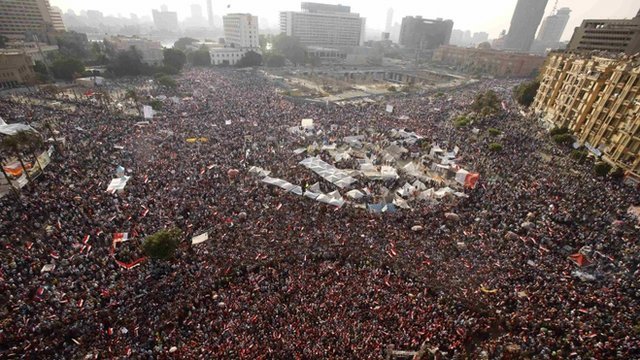
Egypt’s army has moved into key sites in Cairo hours after its ultimatum passed for President Mohamed Morsi to resolve a political crisis.
Tens of thousands of pro- and anti-Morsi protesters have gathered in areas of the capital, as Egyptians await a televised statement.
Opposition figure Mohammed ElBaradei and religious leaders will make this statement, the state news agency said.
Before the deadline passed, Mohamed Morsi repeated his refusal to step down.
His aides took to social media to describe the events as a military coup but there was no confirmation of this.
There are unconfirmed reports that Egyptian officials have placed an international travel ban on Mohamed Morsi and other senior members of the Muslim Brotherhood.
The army is involved in a show of force, fanning out across Cairo and taking control of the capital.
He described seeing eight armored personnel carriers heading for Cairo University in Giza, where one of the main pro-Morsi demonstrations was being held. At least 16 people were killed and about 200 wounded at the university when gunmen opened fire on protesters on Tuesday night.
Another pro-Morsi protest was being held in Nasr City, where New York Times reporter Kareem Fahim tweeted that soldiers had fired into the air to disperse demonstrators.
Opponents of the president gathered in Tahrir Square in their tens of thousands. When the army’s 48-hour deadline passed, cheers echoed across the square.
Whether it is a military coup or not, on the streets of Cairo it certainly looks like one.

Before the army’s ultimatum to President Mohamed Morsi expired at 16:30 local time, he posted a Facebook message calling for a roadmap involving an interim coalition government.
His whereabouts were not immediately clear but BBC Arabic confirmed that he was at the Cairo headquarters of the Republican Guard, a military site where he has stayed since the start of the protests.
One of Mohamed Morsi’s aides, Issam al-Haddad, wrote on his Facebook page that he was “fully aware” his words might be the “last lines I get to post on this page”, adding that what was happening was a “military coup”.
The army had earlier held meetings with political and religious leaders to discuss the crisis.
But the ruling Freedom and Justice party – the political arm of Mohamed Morsi’s Muslim Brotherhood – stayed away from the talks.
Mohamed Morsi’s opponents have accused him and the Muslim Brotherhood of pushing an Islamist agenda onto Egypt, and say that he should stand down.
In a defiant televised speech on Tuesday evening, Mohamed Morsi said he would give his life to defend constitutional legitimacy, and blamed the unrest on corruption and remnants of the ousted regime of Hosni Mubarak.
Army chief Gen Abdel Fattah al-Sisi was reported to have met his top commanders on Wednesday – and a source close to the military told AFP news agency they had been discussing details of a post-Morsi roadmap.
Members of the Tamarod (Rebel) movement, which has mobilized millions of demonstrators onto the streets to demand Mohamed Morsi’s resignation, were also part of the meeting. So too were leading religious figures and Mohammed ElBaradei.
The president was put under further pressure by the resignation of six ministers from his government on Monday, including Foreign Minister Kamel Amr.
Mohamed Morsi became Egypt’s first Islamist president on 30 June 2012, after winning an election considered free and fair following the 2011 revolution that toppled Mubarak.
But dissent has been growing, with protesters angry at the lack of change in post-revolution Egypt and accusing the Brotherhood of trying to protect its own interests.
“This is a president threatening his own people. We don’t consider him the president of Egypt,” said Mohammed Abdelaziz, a leader of Tamarod.
However, Mohamed Morsi and the Brotherhood still have significant public support, and both sides have drawn huge numbers to rallies in recent days.
At least 39 people have now died since the protests began on Sunday.
The instability has also hit global oil prices, sending US light crude above $100 a barrel for the first time since September last year, amid concerns supply routes through the Suez Canal could be affected.
[youtube 51zdsRubclE]